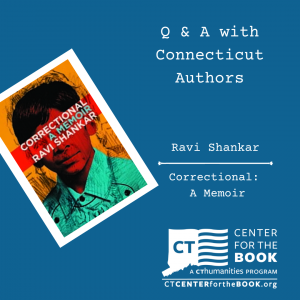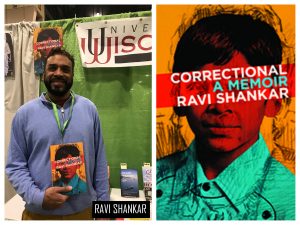Registration is open for the 2022 Connecticut Book Awards!
When: October 23, 2022 | 3:00-5:00 p.m.
Where: Hartford Public Library
Please note that clicking the button will bring you to another site for registration.
Q&A
COVID is still with us, although easing off a little, thank goodness. Did you have a favorite comfort genre to turn to when things were looking bleak? Something that lifted you away and to a different place for a while?
I found myself dipping back into noir, re-reading Raymond Chandler’s pithy, punch prose, and discovering works that re-interpret the genre like the intertwining tension and cultural translation in Suki Kim’s The Interpreter; the way crime becomes a metaphor in the investigations of Walter Mosley’s grudging sleuth Easy Rawlins; or how Jonathan Lethem creates a convincing detective with Tourette’s in Motherless Brooklyn. I even gulped down Gillian Flynn’s Gone Girl in a long night’s sugary sip and read some of Akashic Books’ series of noirs set in different cities from Helsinki to Buffalo to Zagreb. Roger Ebert once called film noir the “most American film genre” because even though it originated with French new wave directors like Jean-Luc Godard and François Truffaut, he believed that no society could create a world so bleak, devoice of comfort, full of fear and ruthlessness, lacking an illusion of a happy ending and navigated by a hard-boiled self-determined anti-hero, unless that society were “essentially naïve and optimistic.” Reading those works returned me to my own life with a new appreciation for mundane yet consoling domesticity.
Where do you get your inspiration?
I used to imagine inspiration born of the lightning strike of wisdom gathering in our collective cloud cover that under the right circumstances I could become the spectrometer for, mapping the surge and voltage in patterns clear to the eye straight down to the heart. I no longer have such a grand oracular vision and now find my inspiration from the minutia of cultivating a greater awareness to the world around me—the people whom I love whose needs I hope to intuit; the sheen of the blooming world encroached upon by machines; the many books whose ideas hone my own; my loyal Sheepadoodle puppy Rishi who leaps after birds with such astonishment and marvel every single time. Then finally it is in the work of drafting and revising, renewing and excising, sharing and integrating, that any piece of writing grows closer and closer to its intended shape, knowing all along as David Foster Wallace wrote, “what goes on inside is just too fast and huge and all interconnected for words to do more than barely sketch the outlines of at most one tiny little part of it at any given instant.” So much fullness and joy and loss and imagination surround us that taking time away from advancing and acquiring, fretting and regretting, a new world floats into view that only we can describe.
Who made reading important to you?
I credit amma, my mother, with her devoted reading to us while we were children. She read us the entirety of Frank L. Baum’s Wizard of Oz series, The Phantom Tollbooth, Alice in Wonderland, James and the Giant Peach, along with narrating a stream of stories from the Indian epics, the Mahabharata and Ramayana. She told us about Hanuman, the monkey-deity who served Rama, and Krishna, the butter-thief. She also encouraged me to read on my own, which I did, curled like a comma on the couch in the back of the local library. I also want to acknowledge my high school English teacher, Dr. Jacobs, who introduced me to the beat and confessional poets, and demonstrated the process of reading like a writer, of reverse engineering a text to see how rhetoric and vernacular help to shape a thought. Even though I attended a science and technology high school in Northern Virginia, Dr. Jacobs saw enough in my reading and writing to encourage me to pursue it as a profession. Finally, I had a professor at the University of Virginia, Lisa Russ Spaar who turned reading into a visceral act like eating, encouraging us to sample from the wide bouquet of critical and creative voices and to let those works dwell in our body and bloodstream so that they could help nurture us now and into the future. I still read greedily and attentively because of her.
What is your favorite book to give an adult or a child?
When it comes to gifts, there can be no template, for I think of books as having personalities that meet the needs of particular people at a given point in their lives. For a friend dealing with a difficult, dying mother, I presented Rodger Kamenetz Terra Infirma : A Memoir of My Mother’s Life in Mine. For a milestone birthday, I gave my sister a signed copy of Maya Angelou’s Phenomenal Woman. I gave one of my daughters The Little Prince and the other Colson Whitehead’s The Nickle Boys. I gifted a copy of a translation of Jayadeva’s 12th century Gita Govinda to one of my translators. I suppose I’ve most often given friends a copy of W.W. Norton & Co.’s Language for a New Century: Contemporary Poetry from Asia, the Middle East and Beyond, the anthology I co-edited with Tina Chang and Nathalie Handal, and that includes over 450 poets from 61 different countries writing in over 40 different languages, some of them translated for the very first time. It’s the kind of book that’s opens outward into a vast world of reading that underscores our celebratory differences and shared humanness.
Tell us your best book-receiving experience.
As a professor in Connecticut, I had the good fortune of getting to know the late Dr. Barry Leeds, an old school iconoclast and Norman Mailer scholar. When I found out that he had hours of conversation with Mailer on cassette tapes in a shoebox in his closet, I helped him digitize them. We would publish the recordings on Drunken Boat, and in these static-ridden, degraded audio files, you could hear the writer flare into passion, cajole his dog, answer a phone call from his agent, and talk about the limits of art, the process through which he generated ideas, and the creeping totalitarianism that Mailer felt was infecting culture. I was so enlivened by unearthing this time capsule that I never would have expected that on our last meeting in his Newington apartment, Barry would present me with a signed first edition of The Naked and the Dead. It’s a volume I still treasure and that someday I will give to my own daughters.
If you had the power to invite any writer or artist, dead or alive, for dinner who would you like to have there and why?
I’d invite Hart Crane, one of the greatest underappreciated poets of the 20th century and someone who took his own life by jumping into the Gulf of Mexico at the age of 32 leaving behind The Bridge, one of the great poetic epics of all time. I wish we could walk together in Brooklyn Bridge Park sampling oysters, discussing his demons and my own, sharing our sense of uprootedness, the logic of metaphor, and how his homosexuality would have come to be accepted if only he had lived long enough to see the riots at Stonewall and the passage of the Marriage Equality Act—progress under threat today—and how as a straight man I’d been deeply moved by his queering of language. I learned from him how the universe could be distilled into the grain of an image, the music of a line. Wondering what response, he might have to the metaverse and de-extinction projects, cruise missiles and electric vehicles, curious what new spiritual epic he might spin from our own fragmented, accelerated time, we would spend the evening roving the piers, under a gibbous moon, silhouetted by the Brooklyn Bridge.
Bio
Ravi Shankar is an award-winning author and editor of more than fifteen books and chapbooks of poetry. He is the founder of Drunken Boat, one of the world’s oldest electronic journals of the arts, and has been featured in The New York Times and on BBC, NPR, and PBS NewsHour. He lives in Providence, Rhode Island with his partner and their dogs, Annie and Rishi.
Synopsis
The first time Ravi Shankar was arrested, he spoke out against racist policing and successfully sued the city of New York. The second time he was arrested, he was promoted to full professor while still incarcerated. Shankar’s bold and complex self-portrait—and portrait of America—challenges us to rethink our complicity in the criminal justice system and mental health policies that perpetuate inequity and harm.









